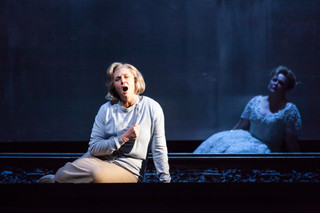|
Back
Weinberg’s Opera Haunts, Challenges Houston
Brown Theater, Wortham Theater Center
01/18/2014 - & January 22, 25, 31, February 2, 2014
Mieczyslaw Weinberg: The Passenger
Joseph Kaiser (Walter), Michelle Breedt (Liese), James Maddalena (Steward, Elderly Passenger), Cheryl Parrish (Senior Overseer), Robert Pomakov (First S.S. Officer), Peixin Chen (Second S.S. Officer), Kevin Ray (Third S.S. Officer), Melody Moore (Marta), Victoria Livengood (Old Woman), Uliana Alexyuk (Ivette), Carolyn Sproule (Vlasta), Natalya Romaniw (Krystyna), Kathryn Day (Bronka), Agnieszka Rehlis (Hannah), Kelly Kaduce (Katya), Morgan Smith (Tadeusz)
Houston Grand Opera Orchestra and Chorus, Patrick Summers (conductor)
David Pountney (Director), Johan Engels (Set Designer), Marie-Jeanne Lecca (Costume Designer), Fabrice Kebour (Lighting Designer)

M. Moore (© Lynn Lane)
Houston Grand Opera has scored a magnificent triumph in presenting the American premiere of Mieczyslaw Weinberg’s Holocaust opera The Passenger. A work of startling intensity, the unrelenting tension in the music is brought vividly to life by all involved.
Weinberg’s music reflects the path of his life. Always on the run from oppression, he encountered the current musical trends of many places in Europe, and, lucky to outlive Stalin’s oppressive reign, lived to see a slight cultural thaw in the USSR and the eventual fall of the Soviet regime. The Passenger, completed in 1968, was composed in Moscow, where Weinberg had formed a close personal and musical bond with Dmitri Shostakovich. Like Shostakovich’s late music (especially the quartets), the music of the opera is primarily dark and grim, its loud passages fiercely dissonant, its softest music often at the extreme registers of the orchestra. Woven into the fabric are folk music, Bach’s D minor Chaconne, tone rows, post-Expressionist angular phrases and moments of nostalgic, Britten-esque tonality, all of which are at times presented purely and at other times presented through a distorted, anguished prism.
The majority of the vocal lines are of a parlando sort that seems to derive from Berg and Debussy. There are precious few arioso moments, but those that do arise, especially the Russian folk song Katya sings midway through the second Act, are more potent because of their rarity.
Most of the singing roles are given to female singers, and HGO has assembled a deep, thorough cast. Most impressive is Melody Moore’s turn as Marta. The role’s demands, both for a singer and an actor, are legion. Utmost control and agility in the voice are required, while a stoic fear with shades of hope are required from facial and bodily expression. Moore handled these challenges with ease, portraying a strong woman hoping against hope and singing with pure tone and flexibility.
All the women in the Auschwitz setting were excellent, but Uliana Alexyuk’s coloratura roulades as she tries to teach Bronka French were especially touching, glimmers of sparkling lightness that were soon to be snuffed out. Kelly Kaduce’s singing as Katya was also extraordinarily pure and touching in the same scene.
Michelle Breedt, singing Liese, had the unenviable task of portraying a protagonist that was tough to empathize with. Guilty of her deeds at Auschwitz, her entire role seems to be one of trying to rationalize her actions. It is a claustrophobic and fickle character, one whose vocal lines and moods often change on a dime. Breedt was excellent and formed a perfect counterweight to Moore.
The men’s roles are mostly small. Joseph Kaiser was also presented with challengingly complex situations as Walter, having to express sympathy, encouragement and outrage, often in a single scene. Morgan Smith’s Tadeusz joined with Moore in the only possible parallel to a love scene in the opera, and the specter of eventuality draped their interaction in an oppressive patina.
The HGO chorus and orchestra sounded incredible. The orchestration, as large as anything Shostakovich or Mahler ever mustered, featured intriguing sounds from saxophone and guitar in the pit, as well as a plethora of pitched percussion. The onstage banda near the end of the opera increased the polystylistic bent of the score. Choral moments were often hauntingly eerie chants or vicious outbursts.
The staging is impressive. A mobile set, with various train tracks on the lower, Auschwitz level, and oppressive railing on the upper cruise ship exposed the dichotomy of past and future. One level was a supposed pathway to a new future, but remained mostly static and barred in, the other was a dead end, but featured a steady stream of prisoners coming and going. The overriding questions, then, is: who was the passenger, who the prisoner?
The Passenger is, by its nature, a challenged to sit through, akin to Shostakovich’s late string quartets or Spielberg’s Schindler’s List. The pacing is slow and consistently dark. That said, it is an important telling of a complex story, and a significant musical link from Shostakovich and Prokofiev to later Soviet composers like Gubaidulina and Schnittke. Seeing and hearing such a dedicated and expert performance is a memorable experience, but returning to the opera again and again would prove difficult. The excellence of this production will shine brightly this summer as it travels to the Lincoln Center Festival to further expose the world to Weinberg’s masterpiece.
Marcus Karl Maroney
|